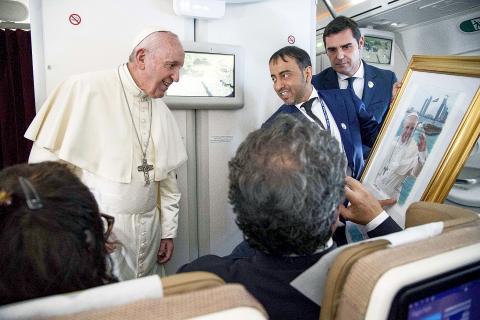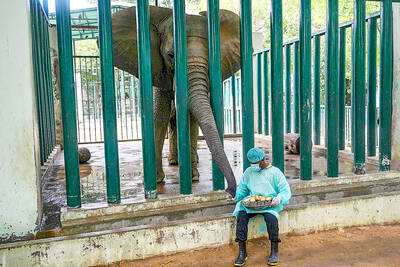Pope Francis on Tuesday publicly acknowledged the scandal of priests and bishops sexually abusing nuns and vowed to do more to fight the problem, the latest sign that there is no end in sight to the Catholic Church’s abuse crisis — and that it now has a reckoning from the #MeToo movement.
Francis admitted to the problem for the first time in public during a news conference while returning to Rome from the United Arab Emirates.
The acknowledgment comes just two weeks before he hosts an unprecedented gathering of bishops to craft a global response to the scandal of priestly predators who target children and the superiors who covered up the crimes.

Photo: Reuters
Francis was asked about priests who target adult women — the religious sisters who are the backbone of the Catholic Church’s education, health care and social service ministries around the globe — and whether the Holy See might consider a similar universal approach to combat that issue.
“It’s not that everyone does this, but there have been priests and bishops who have,” Francis told reporters. “And I think that it’s continuing because it’s not like once you realize it that it stops. It continues. And for some time we’ve been working on it.”
“Should we do something more? Yes. Is there the will? Yes. But it’s a path that we have already begun,” Francis said.
The issue has come to the fore amid the Catholic Church’s overall reckoning with the sexual abuse of minors and the #MeToo-inspired acknowledgement that adults can be victims of abuse whenever there is an imbalance of power in a relationship.
In the past year, The Associated Press and other media have reported on cases of abused nuns in India, Africa, Europe and South America — evidence that the problem is by no means limited to a certain geographic area.
In November last year, the International Union of Superiors General, which represents all the world’s female Catholic religious orders, denounced the “culture of silence and secrecy” that prevented nuns from speaking out and urged sisters to report abuse to their superiors and police.
Women Church World, the women’s magazine of the Vatican newspaper L’Osservatore Romano, just last week identified the clerical culture of the all-powerful clergy as the culprit.
The magazine said that the scandal involves a corollary: nuns being forced to abort the priests’ children or bear children that the priests refuse to recognize.
Francis’ acknowledgement of the problem comes as he prepares to decide the fate of the disgraced US ex-cardinal Theodore McCarrick, who is accused of abusing minors as well as adult seminarians.
That case also cast a spotlight on the issue of abusive power relationships, and whether the church ought to consider seminarians and sisters as “vulnerable adults” when compared to the priests and bishops who control everything from their vocations to their studies and salaries.
Asked if any universal norms might be in the works to tackle the problem — as has been done to handle cases of clergy sexual abuse of minors — Francis implied that the priestly abuse of nuns was being dealt with on a case-by-case basis.
“There are cases, usually in new congregations and in some regions more than others,” he said. “We’re working on it.”
“Pray that this goes forward,” he said. “I want it to go forward.”

NO EXCUSES: Marcos said his administration was acting on voters’ demands, but an academic said the move was emotionally motivated after a poor midterm showing Philippine President Ferdinand Marcos Jr yesterday sought the resignation of all his Cabinet secretaries, in a move seen as an attempt to reset the political agenda and assert his authority over the second half of his single six-year term. The order came after the president’s allies failed to win a majority of Senate seats contested in the 12 polls on Monday last week, leaving Marcos facing a divided political and legislative landscape that could thwart his attempts to have an ally succeed him in 2028. “He’s talking to the people, trying to salvage whatever political capital he has left. I think it’s

Polish presidential candidates offered different visions of Poland and its relations with Ukraine in a televised debate ahead of next week’s run-off, which remains on a knife-edge. During a head-to-head debate lasting two hours, centrist Warsaw Mayor Rafal Trzaskowski, from Polish Prime Minister Donald Tusk’s governing pro-European coalition, faced the Eurosceptic historian Karol Nawrocki, backed by the right-wing populist Law and Justice party (PiS). The two candidates, who qualified for the second round after coming in the top two places in the first vote on Sunday last week, clashed over Poland’s relations with Ukraine, EU policy and the track records of their

UNSCHEDULED VISIT: ‘It’s a very bulky new neighbor, but it will soon go away,’ said Johan Helberg of the 135m container ship that run aground near his house A man in Norway awoke early on Thursday to discover a huge container ship had run aground a stone’s throw from his fjord-side house — and he had slept through the commotion. For an as-yet unknown reason, the 135m NCL Salten sailed up onto shore just meters from Johan Helberg’s house in a fjord near Trondheim in central Norway. Helberg only discovered the unexpected visitor when a panicked neighbor who had rung his doorbell repeatedly to no avail gave up and called him on the phone. “The doorbell rang at a time of day when I don’t like to open,” Helberg told television

A team of doctors and vets in Pakistan has developed a novel treatment for a pair of elephants with tuberculosis (TB) that involves feeding them at least 400 pills a day. The jumbo effort at the Karachi Safari Park involves administering the tablets — the same as those used to treat TB in humans — hidden inside food ranging from apples and bananas, to Pakistani sweets. The amount of medication is adjusted to account for the weight of the 4,000kg elephants. However, it has taken Madhubala and Malika several weeks to settle into the treatment after spitting out the first few doses they